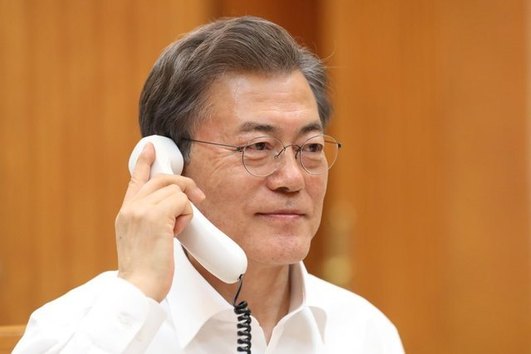Posted on : Jan.6,2018 16:15 KST
Modified on : Jan.6,2018 17:07 KST
 |
|
President Moon Jae-in speaks on the phone with US President Donald Trump on Jan. 4. (provided by Blue House)
|
During a phone call on the evening of Jan. 4, South Korean President Moon Jae-in and US President Donald Trump abruptly agreed to delay the two countries’ joint military exercises. Immediately afterward, on Jan. 5, North Korea accepted the South’s proposal for high-level inter-Korean talks at Panmunjeom on Jan. 9. Just four days after North Korean leader Kim Jong-un’s New Year’s address, during which he stated his willingness for the North to participate in the Pyeongchang Winter Olympics, inter-Korean dialogue has become a reality, following the restoration of the Panmunjeom communication channel, which had been disconnected for 23 months, and the delay of the military exercises.
Inter-Korean dialogue will be held for the first time under the current administration, and for the first time since Dec. 2015, over two years ago. The talks will be a challenge even if they go no further than discussing North Korea’s participation in the Pyeongchang Winter Olympics, which is just over a month away. That is a tight timeframe, if the talks are to cover the scale of participation, the inclusion of cheerleaders and artists, the method and route of their passage to the South, their accommodations and security guarantee, joint statements for the opening and closing ceremonies, and even the possibility of setting up a joint inter-Korean team.
To be sure, the talks will be quite significant and achieve considerable results even if their agenda is limited to discussing North Korean participation in the Olympics. But it’s critical for the talks not to be a one-off event but to be regarded as a turning point that can lead to continuing dialogue in the future to deal with humanitarian issues such as the reunions of families separated by the Korean War.
Rather than being too ambitious, the talks should prioritize building a framework for increasing inter-Korean contact and for facilitating ongoing dialogue. This could be a stepping stone toward future dialogue between North Korea and the US. The delay of the South Korea-US joint military exercises has given North Korea a reason not only to participate in the Pyeongchang Olympics but also to come to the table for dialogue with the US. In this sense, the US’s decision to delay the military exercises for the first time since 1992 is laudable. In addition to delaying the exercises, we hope that the Trump administration will stay in close contact with the South Korean government and be eager to help out during the inter-Korean dialogue that is getting underway.
The worrying thing is that a narrowly legalistic interpretation of UN sanctions against North Korea during the North’s participation in the Olympics could provoke unforeseen friction. There have sometimes been unexpected incidents when North Korean athletes or cheerleaders attended events in the South. This can largely be attributed to the fact that North and South Koreans are rarely able to meet. We hope that the governments of South Korea and the US will both exercise their judgment and act with wisdom within the larger context of easing tensions and promoting peace on the Korean Peninsula.
As the prospect of North Korea attending the Pyeongchang Olympics has become more likely, some conservatives in South Korea have raised numerous concerns, including that the South Korea-US alliance may be weakened, that UN sanctions against North Korea may be violated and that the military deterrent against the North may be downgraded. We are not unaware of North Korea’s intentions or the US government’s concerns. But there is ample reason to believe that these conservatives’ claims are trivial nitpicking – making a mountain out of a molehill. After all, even Trump said that talks are “a good thing” and expressed his full support for Moon while agreeing to delay the military exercises.
It’s sad to see conservative figures who are always talking about “security” panicking about dialogue returning to the Korean Peninsula. We hope that they won’t place any obstacles in the path of inter-Korean dialogue.
Please direct questions or comments to [english@hani.co.kr]






